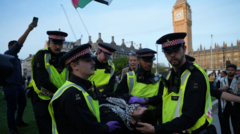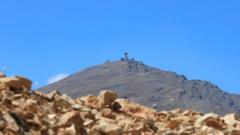Will MPs Sway the Minister on Palestine Action?

Published: 2025-09-08 20:42:13 | Category: technology
The UK government faces mounting pressure to reconsider its proscription of Palestine Action following significant protests and mass arrests. With 890 individuals detained during a London demonstration against the ban, critics argue that the government's actions blur the lines of legitimate protest and terrorism. While Security Minister Dan Jarvis defends the proscription, many MPs call for a review of how anti-terrorism laws impact the right to protest.
Last updated: 25 October 2023 (BST)
Understanding the Proscription of Palestine Action
The UK government proscribed Palestine Action under anti-terrorism legislation in July 2023, classifying the group as linked to terrorist activities. This decision has sparked considerable debate, particularly following recent mass protests against the ban. The scale of the arrests during these demonstrations has drawn comparisons to historical events, such as the poll tax riots of the 1990s, and raised questions about the implications for civil liberties and the right to protest.
- 890 arrests occurred during a recent London demonstration against Palestine Action's ban.
- The group was proscribed under anti-terrorism laws in July 2023.
- Critics argue that the government's actions threaten the definition of terrorism.
- Calls for a review of anti-terrorism legislation are growing among MPs.
- Security Minister Dan Jarvis insists that the proscription is necessary for public safety.
The Context of the Proscription
The proscription of Palestine Action was framed by the UK government as a measure necessary to combat terrorism. This decision came amid rising tensions regarding the Israel-Palestine conflict and increasing protests advocating for Palestinian rights. Critics of the ban assert that the government's classification of Palestine Action as a terrorist organisation undermines the seriousness of the term "terrorism" and may have chilling effects on free speech and peaceful protest.
What is Palestine Action?
Palestine Action is a direct action group that campaigns against the UK’s arms trade with Israel and advocates for Palestinian rights. The group has been involved in various forms of protest, including occupations and demonstrations that have sometimes resulted in clashes with law enforcement. The UK government's classification of the group as a terrorist organisation stems from allegations of violent tactics and connections to extremist ideologies.
Government Response to Protests
Following the mass arrests during the recent protests, Security Minister Dan Jarvis reiterated that the decision to proscribe Palestine Action was based on expert assessments. He maintained that while peaceful protests about Palestinian rights are permissible, supporting a group deemed to have terrorist connections is not. This stance has provoked strong responses from opposition MPs, who argue that the government is misusing anti-terrorism laws.
The Scale of Recent Protests
On a recent Saturday, thousands gathered in London to protest the ban on Palestine Action, leading to a total of 890 arrests. Many of those detained were reportedly peaceful demonstrators, raising concerns about the appropriateness of police actions in response to non-violent protests. Critics, including Labour MPs, have described the arrests as "authoritarian" and "absurd," arguing that targeting individuals for holding placards or expressing dissent is disproportionate.
Comparisons to Historical Protests
The scale of the arrests has drawn comparisons to the poll tax riots, a significant moment in UK history where mass protests led to widespread disorder and dissent against government policy. The current situation has led to questions about the state of civil liberties in the UK and the implications of using anti-terrorism legislation to suppress dissent.
Calls for Legislative Review
In the wake of the protests and arrests, several MPs have called for an urgent review of the UK's anti-terrorism laws, particularly as they pertain to the right to protest. Liberal Democrat spokesperson Lisa Smart expressed concern that the mass arrests set a dangerous precedent, suggesting that existing laws already adequately address issues of violence and hate speech without infringing on the right to peaceful assembly.
Criticism from Opposition
Opposition leaders have voiced their concerns about the government's handling of the situation. Labour MP Stella Creasy warned that the dilution of the term "terrorism" could undermine its seriousness, while other MPs have urged for a clearer distinction between peaceful protest and violent extremism. The sentiment among critics is that the government is overreaching its authority and failing to protect the rights of citizens to express their views.
Government's Defence of Proscription
Despite the backlash, Dan Jarvis defended the government's decision, asserting that the proscription is essential for public safety. He argued that while many individuals may peacefully protest for Palestinian rights, supporting a group that has shown willingness to engage in violence cannot be tolerated. This distinction has become a focal point in the ongoing debate about the balance between national security and civil liberties.
Statements from MPs and Public Figures
Various MPs have expressed their discontent with the government's actions. Kim Johnson described the arrests as targeting innocent individuals, and former Labour leader Jeremy Corbyn urged for the protection of peaceful protest rights. The diverse range of opinions highlights the complexity of the issue and the growing divide between government and opposition perspectives on civil liberties and security.
What Happens Next?
The ongoing debate regarding the proscription of Palestine Action and the recent arrests is likely to continue as more MPs and public figures voice their concerns. Calls for legislative review may gain traction, especially if public sentiment continues to favour the protection of civil liberties. The government's response to these demands will be crucial in shaping the future of protest rights in the UK.
The Role of Public Sentiment
Public opinion may play a significant role in influencing government policy moving forward. As protests continue and awareness of these issues grows, the potential for a shift in legislation becomes more plausible. The government's ability to balance national security with the right to protest will be tested as the situation evolves.
Conclusion
The proscription of Palestine Action and the mass arrests that followed have ignited a fiery debate about civil liberties, national security, and the nature of protest in the UK. As MPs continue to scrutinise the government's actions, the future of anti-terrorism legislation and its impact on peaceful assembly hangs in the balance. How the government navigates this complex issue will significantly affect the landscape of protest rights in the UK.
#PalestineAction #CivilLiberties #ProtestRights
FAQs
What is Palestine Action?
Palestine Action is a direct action group that campaigns against the UK’s arms trade with Israel and promotes Palestinian rights through various protest methods.
Why was Palestine Action proscribed?
The UK government classified Palestine Action as a terrorist organisation due to alleged violent tactics and connections to extremist ideologies, leading to its proscription under anti-terrorism laws.
What happened during the recent protests?
During a demonstration in London, 890 arrests were made, drawing criticism for targeting peaceful protesters and raising concerns about the implications for civil liberties.
What are the criticisms of the government's actions?
Critics argue the government's use of anti-terrorism laws blurs the definition of terrorism and sets a dangerous precedent for suppressing free speech and peaceful protest.
What do MPs say about the proscription?
Many MPs, including Labour members, have called for a review of the proscription, arguing it threatens civil liberties and misuses anti-terrorism legislation against peaceful demonstrators.



